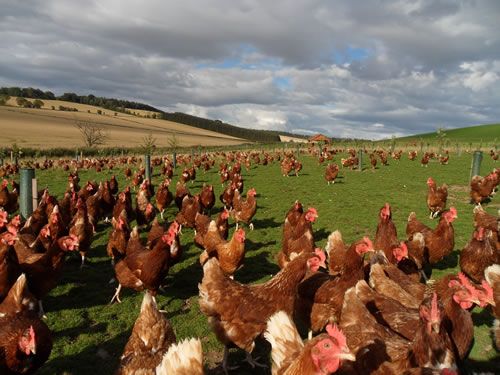
The United Kingdom could lose a large amount of its free range egg production unless market conditions begin to improve.
Results of a survey conducted by the British Free Range Egg Producers Association indicate that nearly 12 per cent of the country’s commercial free range flock could disappear if producers continue to lose money. That equates to a staggering 2,000,000 layers.
With costs increasing and producer prices down, latest BFREPA costings show that free range egg producers are currently losing nearly £5.00 per bird. The losses are even higher for organic producers – more than £6.00 per bird – and there are fears that the crisis could last until the middle of next year.
BFREPA chairman John Retson has been warning that future UK free range egg supplies could be put at risk unless retailers and packers increase the price they are paying for eggs. The association’s latest survey reinforces his warning, with many BFREPA members saying they will reduce numbers or end production completely unless the market improves.
Producers were asked by BFREPA to complete a questionnaire outlining their current stocking levels and indicating their future intentions.
Responses have so far been received from producers responsible for over 5.1 million layers. Their returns showed that 396,100 birds had already been taken out of production and another 428,106 are due to be removed. Even more producers commented that they will leave the industry during 2012 unless they saw an improvement in conditions. Together, these figures would account for in excess of 16 per cent of birds, although some producers indicated that they would increase numbers. The net effect would be a reduction in bird numbers of almost 12 per cent.
Many of the producers who completed returns also took the opportunity to express their frustration at the current state of the market. "With egg price cuts of around £36,000 (12p/doz), feed price increases of around £44,000 (£70/tonne) and pullet price increases of around £3,250 it is financial suicide to continue," said one member.
Some were quite clear that they would stop producing eggs if nothing changed. "Will cease production if no improvement," said one. "If returns are not better will look to sell property and business in the New Year," said another. For yet another producer, matters will come to a head even sooner. "All birds will go at the end of November if we have not received a significant price increase i.e. 20p/doz," he said.
Some producers say they have no option but to carry on in the hope the market improves because they are trapped by bank loans. "I invested in a new efficient multi-tier system just before the market crash. There is no choice but to continue at a loss as the bank are demanding repayments on the investment loan and we have to go down fighting if need be," said a producer, who said he was going to lose £100,000 on the first flock. "Damned if we do and damned if we don’t continue. Very tough and precarious times," he said.
Another one said. "If we could leave our house empty we would, but we still have finance on our sheds to pay for. There is no money to be made at the moment and who knows what will happen, especially if feed prices stay high and egg prices low."
Many vented their frustration at how the current oversupply in the egg market had been allowed to develop. "Growth must be better controlled. The boom and bust culture cannot carry on." And some producers directed their anger at packers and supermarkets for their perceived profiting from the current state of the market. "The major packers seem to prefer to have a large oversupply rather than risk not being able to give the supermarkets what they want at any given moment. The packers still make money when the market is oversupplied. The producers obviously do not. All the time the packers control the bird numbers the plight of producers will continue." "Supermarkets seem to make huge profits, as do the packers, and it is the producer who has all the work and the stress," said one. Another simply said, "Fed up of subsidising supermarkets."
Some producers have become so frustrated with the returns on offer from supermarkets and packers that they have switched to alternative ways of marketing their eggs. "Will be looking to market production more directly to the retail customer and wholesale outlets," said one producer. Another said, "Long term we intend to develop our doorstep sales. Our goal is to cater for this market only as we have no confidence in supplying a packer for the supermarkets."
John Retson has already held meetings with both packers and supermarkets to highlight the crisis currently facing free range egg producers. He has warned that unless producers are able to return to profitability the future security of the UK supply chain is seriously at risk.
"The survey conducted by BFREPA rams home the message we have been flagging-up for over six months now. Both packers and retailers need to consider this as a wake-up call for I believe it is just the tip of the iceberg," says John. "The producers who have responded and informed us of their decision to quit the industry are the ones who have already made that difficult decision but what about the ones who are teetering on the edge?
"We know that there are a lot of producers out there who are waiting to see whether the market improves before they decide whether to continue in the industry long-term. And for some the decision will be out of their hands because it is becoming clear that the banks are tightening their grip on producers who have extended borrowings. It is a very serious situation indeed."
